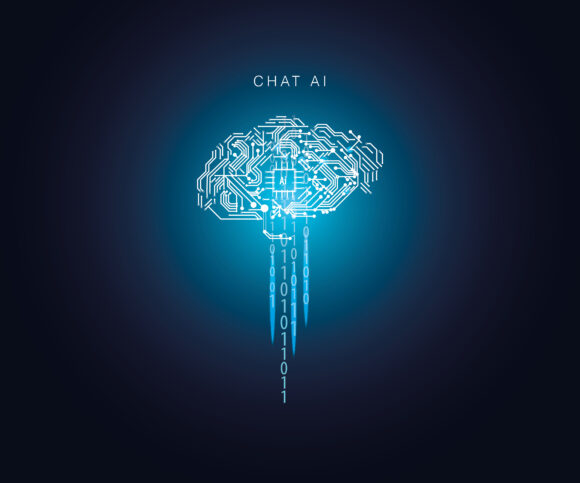Late last year, most Americans began to hear about a new application of artificial intelligence (AI) called ChatGPT. Soon, this application, from a data science company called OpenAI, became the hot topic at every meeting, trade conference or internet search. Surely, by now, you have heard of it and perhaps you’ve even begun the process of thinking about how it will impact your life and business. I certainly have.
AI isn’t new. We’ve been using it for years in tools like Apple’s Siri and even in tools as prosaic as Microsoft Word with its spell check and sentence completion algorithms. Actually, scientists have been building the base for AI since the 18th century. A recent article by McKinsey pointed out famous scientists like Alan Turing, most widely recognized for cracking the Nazi’s Enigma code during World War II, have been making great strides since the middle of the 20th century. But, even with everyday use of AI tools over the last decade, most people have been shocked to learn the real capabilities of today’s generative AI.
Peter Diamandis, serial entrepreneur and author of Abundance, The Future is Better Than You Think, has a formula he uses to describe the exponential progress of a technology called the “6D’s Formula.” He says that technology is first “digitized,” then it is “deceptive,” then “disruptive,” followed by “demonetized,” “dematerialized” and, finally, “democratized.”
The process of digitizing AI began almost 80 years ago, and its capabilities have largely been deceptive since then. In 2022, we all became aware of its ability to disrupt.
AI vs. Humans
Right now, you can do some pretty amazing things in your personal life and business using generative AI tools like ChatGPT, Bing Chat, Bard, Character.ai and others. And I’ll detail some of those things below. But for now, let’s compare a tool like ChatGPT to the human brain to help us understand not only its limitations but where it is heading.
ChatGPT was “trained” on 45 terabytes of data, according to McKinsey. That’s equivalent to about 25% of the Library of Congress’ holdings. While that sounds like a lot, consider that we are currently adding approximately 97 zettabytes of data annually worldwide according to Statista.com. That means ChatGPT has only learned about 5% of what the world added to data just last year. So, AI apps have much to learn!
As a comparison, the human brain’s memory capacity is estimated to be 2.5 petabytes, or one million gigabytes according to Scientific American. And, while supercomputers, which are running tools like ChatGPT, are fast, the human brain is still about five times faster.
What’s my point? As amazing as these new tools are, they are still in the infant stage of development. In Diamandis’ terms, they are just now moving from deceptive (we don’t see them) to disruptive (they are ready to change things).
If we go back into the midst of prehistory when humans first discovered fire, two really important learnings occurred almost simultaneously. Because it was new, fire was scary. As soon as someone touched it, it became terrifying. But, in the same moment or shortly after, someone else began to consider using fire to improve their way of life. With experimentation, millions of years later fire is perhaps humankind’s most ubiquitous and useful tool.
To speed generative AI on its way to becoming truly useful, nearly $2 billion dollars has been invested during the last three years in new start-up ventures just to expand the capability of the current tools. Over the next few years, we should expect to see these tools moving on Diamandis’ scale to the truly disruptive phase.
Using AI to Your Agency’s Advantage
So, what are some things you can do with these tools right now to improve your agency’s operations?
Email. Generative AI tools are just mega consumers of words with algorithms for prediction in their simplest form. Email is just a large quantity of words. ChatGPT can be used to read every email you’ve ever sent, learn your speech patterns, preferences and then compose and respond, schedule, set automated responses, prioritize your inbox and schedule your emails.
I did an estimate of my own time a few years ago and discovered I spent up to 500 hours per year on email. How much time do you spend? What’s your time worth per hour? What would a simple application of a rudimentary tool translate to for you and your business? My son, CEO of a startup software company, with hours of emails to manage each day says it’s saving him several hours a day after a few hours’ investment in training time.
Marketing. ChatGPT and similar tools can create content of all kinds almost instantaneously — including articles, blog posts, videos, brochures, web pages and virtually anything else you can think of that uses text, video or audio.
Do you have an agency brochure? Of course. Do you have a distinct one for the various niche markets you serve? Probably. But do you have one for every unique client or prospect that is written at their ultimate education level, with vernacular unique to their industry, hobbies, location and business size? You can, along with custom generated visuals designed to uniquely appeal to them.
Do you need exactly 653 words in a blog post about your agency’s new office location written in the words and style of Kevin Costner’s character John Dutton on Yellowstone? No problem. Give me five minutes. If you can imagine it, you can probably do it, quickly, cheaply and effectively.
Research. Think of all the things you need to look up, read, learn and summarize in your daily work — unique products your prospect makes, the micro-economic forecast for a niche industry based on macro-economic trends, court cases on points of coverage, relative product strengths among the insurance companies in your agency, and so on. ChatGPT can assist with all of that and more. Think of Google search as your old Model T and ChatGPT as your new Bugatti Veyron.
Facing the Fear
I’ve listed just three examples of how these newly available tools can be useful to you right now. Hopefully, they will serve to ignite your imagination with the almost limitless ways you may be able to use them. But remember, in relative terms, today they have the capability and reach of a campfire. Within just a few years, as generative AI becomes in Diamandis’ scale “democratized,” these tools will be as commonplace as a kitchen match.
This brings me back to the two human reactions to fire, and many new inventions for that matter — fear and innovation. These new tools promise to speed up work processes, create efficiencies and potentially eliminate the work done now by many people.
That is scary. And there will be disruption as the tools gain increased capability, speed and adoption.
But these tools aren’t human, and even though Google’s AI may have passed the Turing test by creating a machine that can “think,” these machines aren’t human, they are only tools.
The future, without fear, is dependent on learning to use the new tools. Those who adapt to AI will have a brighter future. Those that do not, may have no future at all.
Was this article valuable?
Here are more articles you may enjoy.



 Lawyer for Prominent Texas Law Firm Among Victims ID’d in Maine Plane Crash
Lawyer for Prominent Texas Law Firm Among Victims ID’d in Maine Plane Crash  Beazley Agrees to Zurich’s Sweetened £8 Billion Takeover Bid
Beazley Agrees to Zurich’s Sweetened £8 Billion Takeover Bid  Allstate CEO Wilson Takes on Affordability Issue During Earnings Call
Allstate CEO Wilson Takes on Affordability Issue During Earnings Call  Allstate Doubles Q4 Net Income While Auto Underwriting Income Triples
Allstate Doubles Q4 Net Income While Auto Underwriting Income Triples 


